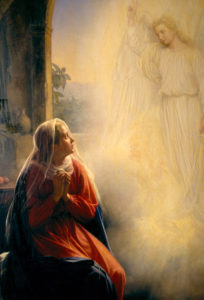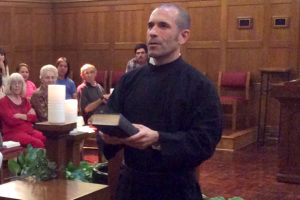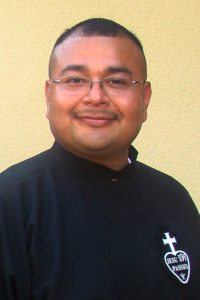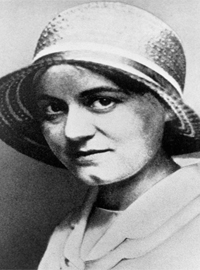Memorial of the Queenship of Mary
Reflection:
We have a rich tradition dealing with the concept of light. We have sayings and concepts in abundance speaking of the importance and place of light in our lives. “Better to light one candle than to curse the darkness.” “This little light of mine, I’m going to let it shine.” The light shows called fireworks celebrate all of the joyous moments of life. Thomas Kincaid is called the ‘painter of light’ and his artwork highlights the beauty and importance of light in our world. The voice of a hotel chain echoes through the night, “We’ll leave the light on for you!” Our pilgrim ancestors in Massachusetts often talked about the Massachusetts Bay Colony as a ‘Light on the Hill’ for the world to see. Following along with that image of a light on the hilltop, we continuously marvel at the beauty of our array of lighthouses along our coasts which guided ships safely through our coastal waters. There are always the scriptures, too. Genesis says, “Let there be light – and there was light” while the Gospel reminds us, “A person does not light a lamp and put it under a bushel, rather he places it on a stand so that it gives light to all in the house.”
As we celebrate the Queenship of Mary, we look at our scriptures for the day to discover something of the idea of Mary’s reign as Queen of Heaven and Earth. As we read Isaiah, we might be tempted to say to ourselves, ‘If you have it, play it.’ No, not the lottery or the Power Ball, but Handel’s Messiah and more specifically “For Unto Us a Child is Born.” This is the passage Handel put to music in this portion of the Messiah. The introductory image is what? That’s right – light. The people who walked in darkness have seen a great light. In a land of doom and gloom, a light has shone. The light brings joy, happiness and rejoicing of immeasurable magnitude. Isaiah is proclaiming the promise God made from the time of Adam and Eve to send a Savior to redeem humankind. Until this Chosen One arrives, people will live in darkness yearning for the light. The light, when He arrives, will make all things visible, all things clear. All will be able to see the entire world, its people and their purpose in a new way, in a new light which will give birth to joy instead of gloom, hope instead of doom, freedom instead of shackles, and promise instead of dead ends.
The prophecy ends with, “The Lord of Hosts will do this!” When will He do this? St. Luke announces the good news in the amazing moment of the Annunciation. The handmaiden Mary consents to be the Mother of God. Suddenly, dawn is breaking. The light is coming into the world. Our Wonder-Counselor, God-Hero, Father-Forever, and Prince of Peace will bring the light that lasts forever. He will open our minds and hearts to the brilliance of the glory of God. We will see our God and each other in the light of Christ and nothing will ever be the same.
Those simple words, “Let it be done unto me according to your word”, made all of this possible. Was it Mary’s humility that clothed her in regal splendor? Perhaps it was her willingness to listen to the Lord’s voice through Gabriel or perhaps her abiding faith in God’s will for her life that was the key. Maybe it was Mary’s trust that God would direct her every moment that lifted her up past the questions and hesitations. Then again, it might well have been her generous spirit in giving birth to the Light of the World or her ever deepening love of the Lord that earned her crown of queenship.
In reality, the only answer can be that it was all of the above and then some. These marvelous attributes of Mary join together to move God to place Mary among us and with us and all the Saints as our Queen of heaven and earth. Her very character in the gospels reveals to us that this is not a lofty and distant royal woman but rather one who stands with us as our Mother and for us as our Intercessor as we gather before the throne of the Lord God. As such, Mary our queen is a true gift to us.
We are invited to be faithful companions to Mary our Queen who follow her Son and seek to let our light shine before all so all may see the good that we do and give glory to God.
Fr. Richard Burke, CP, is a member of St. Paul of the Cross Province. He lives at St. Ann’s Monastery in Scranton, Pennsylvania.








